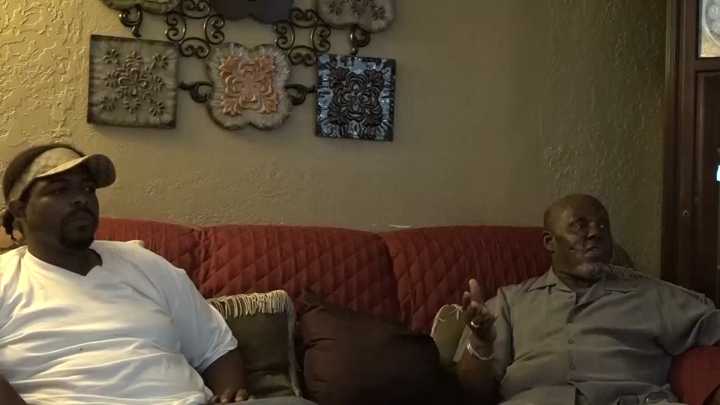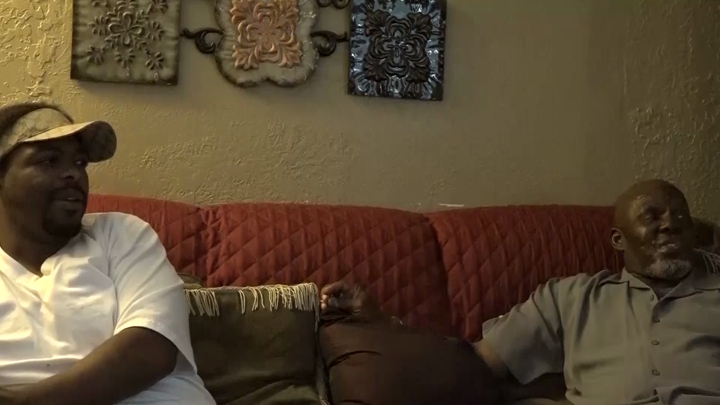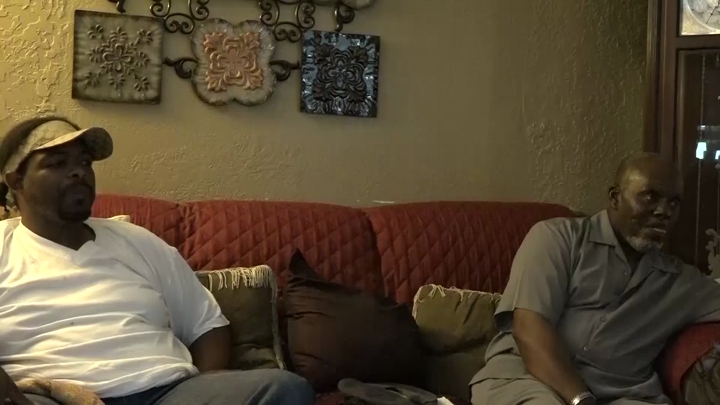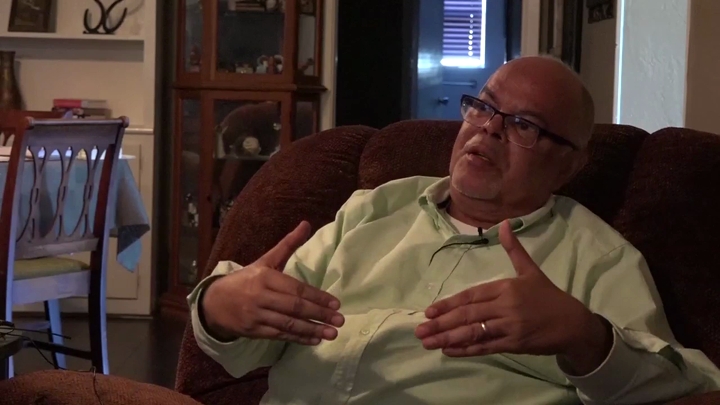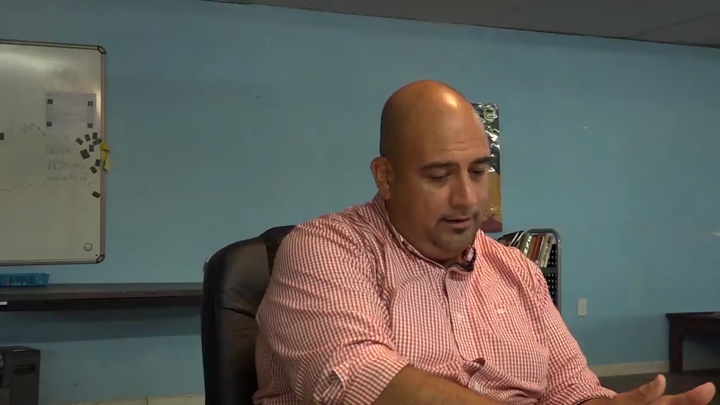Lee / Community Aspects, Part Three
sign up or sign in to add/edit transcript
Lee: There are no businesses in Dugan now. Proctor: None. Lee: The only businesses there now are the undertaker and the churches. Those are—that’s the only businesses there. They had tire places, sandwiches places, anything you wanted to name. Even had clothing places there. Now Dugan is a ghost, like Pal where I grew up at. Pal had all these places, it was filled with black people. The negroes that died out moved out, all the old ones, they bought up all the land and now they’re pushing the rest of them on back in the woods back down there and now they running them out of there. They done took the city limit and put it way out there in the Neck out there where y’all’s church is at. (inaudible) High-rise apartments all the way back down through there. So where—you know, the black man, they’re just taking his land. They’re taking it. So, they’re crowding him out and they’re waiting on him to die so they can take it, just like here. If these people doesn’t stand their ground and hold on to what they got, Woodlands and Shenandoah will move in here and take it all. Interviewer: So, would you guys say that there’s been a resegregation? Proctor: Yes ma’am. Totally. Lee: Yeah, yeah. Proctor: Because if you come to the community and you just look around Conroe, they have built and remodeled all around the Dugan area. I think it’s still in the play and they’re arguing with it now, the money that was for rebuilding the Dugan area, putting sidewalks, lights— Lee: Getting that ready for them. Proctor: —in the community. They took that money and redid downtown Conroe. That walkover that you see, that was money for Conroe, Dugan, Texas specifically. They only came and dug out one branch between Avenue F and the Bottoms which they call Thirteen, Twelfth Street and Tenth Street. They poured a little concrete, that was it. They put a little sidewalk, some railing, two lights, that was it. Lee: They’re getting that ready because they’re going to take over Dugan. Dugan’s going to be gone like Pal. It’s going to be gone. Proctor: And just like he was saying, as far as the Habitat houses, I see it in a good way, in a sense, and then just like he said, I don’t. Because the ones that you’re building these houses for are the older people. You know they don’t have enough income to keep up with what you expect them to keep up on. So, what happens when they can’t keep up on? It’s your house now. You can do with it as you please, so now they have no land. So where do you want them to go now? They already was not employed. The SSI wasn’t paying their regular bills, but you disguise it as you’re doing something good for them, you’re going to build them a new house. Them being older people, they’re like “Yeah, I would love me a new house before I leave this world.” I would accept it if I was in that position, but they’re not seeing, I would say, they’re in their inner-mind thoughts behind the whole program, because once they have enough just like the pastor just stated, who’s to stop them from coming in and just saying, “Okay, well, we want to do something else with this property.” Lee: Time to go. Proctor: I can—yeah, okay, you’re a senior citizen. I can put you in this senior citizens home. They’re going to pay all the bills. You don’t have to worry about anything no more. Now I have a free house and land that I got back and just got paid for building it. So, now I have it back. I can tear it down or I can resell it. Lee: Now they’re putting you over there in these apartment buildings and now you become a hostage in your own house just like you’re in Beirut somewhere because you’re surrounded by drug addicts, dope fiends. Everything’s in there. People shooting people every twenty-four hours. Killing people. Thieves. Robbers. Proctor: They’re quick to all about the infestation and the drugs and the people in the Dugan area, but look what you drop every day. Lee: Prostitutes. Proctor: You drop off twenty to thirty people, random people every day. Every day the bus runs you drop off twenty to thirty people. Interviewer: Where are they coming from? Proctor: We have no idea. Most of them are just getting out of TDC. They’re coming straight from Huntsville, straight down 45. They’re either going to get dropped off in Conroe or they’re going to go downtown Houston to the bus station. Lee: It’s like Commerce. You been out on Commerce in Houston? Proctor: Interviewer: Uh-huh. Yeah. Lee: This is the way First Street is beginning to look. Proctor: They beef up the police over in Dugan, but they’re harassing. I mean, you’re saying it’s infested but look what you’re allowing to come in here every day. You don’t see a new police officer in the Dugan area until his quotas down. That’s the only time you see a new police officer over there. He’s trying to meet his quota because they know where to come to fill their quota and everybody knows the times of the month. “Man, you don’t want to be riding right now.” “You don’t want to go to Dugan right now because they’re trying to get their quota.” Lee: I watched the drug addicts go from the older guys to the young—every day there’s a new set of kids on the block selling dope, saying he’s coming up. Where you going? Nowhere. Everything you got is in your front pocket. When the cop busts you, it’s gone. That old raggedy car you done bought and you got two thousand dollars’ worth of rims on it. It’s gone. You parking it in your mother’s front yard. Proctor: I’m not saying there’s not outlets and things out there for us but make them more available to us. That’s my thing.
| Interview | Interview with Charles Lee and Toddrick Proctor |
| Subjects | Work › Black-Owned Businesses |
| Housing › Neighborhoods › Residential Segregation | |
| Religion › Churches | |
| Community Organizations | |
| Geography › Places (Cities, Towns, Neighborhoods, and Intersections) | |
| Geography › Spatial and Residential Segregation | |
| Geography › Geographic Disparities in Infrastructure | |
| Police and Law Enforcement | |
| Tags | sign up or sign in to add/edit tags |
| Interview date | 2016-07-21 |
| Interview source | CRBB Summer 2016 |
| Interviewees | Lee, Charles |
| Proctor, Toddrick | |
| Interviewers | May, Meredith |
| Locations | Houston, TX |
| Huntsville, TX | |
| Conroe, TX | |
| Pall, TX | |
| Duggan, TX | |
| Duration | 00:06:17 |
| Citation | "Community Aspects, Part Three," from Charles LeeandToddrick Proctor oral history interview with Meredith May, July 21, 2016, Tammany, TX, Civil Rights in Black and Brown Interview Database, https://crbb.tcu.edu/clips/3147/community-aspects-part-three, accessed March 04, 2026 |


